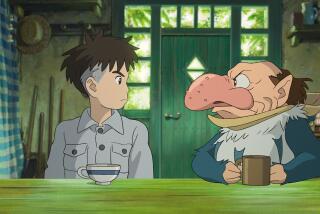‘Samurai Jack’ creator knows how to hold your attention: Get rid of the dialogue
Genndy Tartakovsky didn’t plan on challenging how people watch TV when he developed his new cartoon. But “Primal” demands your complete attention.
The Adult Swim show, which premiered Monday, follows the adventures of — and the evolving relationship between — a caveman, Spear, and a dinosaur, Fang, who have experienced parallel tragedies. One episode of the 10-episode series is set to air each day through Friday, with the remaining five episodes coming at a later, to-be-announced date.
For the record:
2:27 p.m. Oct. 8, 2019An earlier version of this story incorrectly stated that all 10 episodes of “Primal” will air this week. Five of the episodes will air at a future, to-be-announced date.
“Primal’s” prehistoric world is vicious and violent, with inescapable reminders that every creature is predator and/or prey. Their bloody, brutal, beautifully animated story is told without a single line of dialogue.
It wasn’t until working on “Primal” that Tartakovsky really noticed how much people watch television without actually watching the television.
“I never realized how much we don’t watch and we just listen,” Tartakovsky told The Times in a recent interview. With “Primal,” “You kind of just get drawn in and you forget. And if you turn away, you’re going to miss a whole bunch.
“With everybody used to multitasking on their phones and everything, it’ll be interesting to see the effect,” he added.
Though the lack of dialogue doesn’t hinder the storytelling — and the series is far from silent, anyway — the absence of any spoken language means almost everything is conveyed through the animation. Every expression, every pause, every sound, every movement: All of the components work together to deliver the nuances of each episode. So viewers really can’t afford to look away.
It would be a formidable ask from a lesser show. But “Primal” is captivating enough, Tartakovsky recalled, that his Adult Swim boss Mike Lazzo even forgot he was holding a slice of pizza during a screening of the second episode.
While Tartakovsky said he didn’t specifically set out to create a show that would discourage distracted viewing, the “Dexter’s Laboratory” and “Samurai Jack” creator is aware that audience habits have changed since he started working in animation.
The internet was in its infancy when “Samurai Jack” debuted in 2001. But by the time the fifth and final season of the series premiered in 2017, the internet and social media were inescapable.
Tartakovsky said that it took him time just to accept the new normal established in the intervening years, with people habitually providing commentary on social media as they’re watching.
“It would drive me insane, because animation is so labor intensive. We produce every frame and all these drawings, everybody’s great work,” Tartakovsky said. “It’s something that took me a while to kind of just accept. It’s the way people watch TV now. We’re always doing other things at the same time.”

The inspiration for “Primal” was sparked long before Tartakovsky experienced these frustrations. Years ago, he started doodling versions of a caveman boy and his T. rex buddy that would eventually become Spear and Fang, envisioning a show for kids. He set the idea aside, then was reinspired by the final season of “Samurai Jack.”
For its fifth season, “Samurai Jack” jumped from Cartoon Network to Adult Swim — and a more adult audience. This allowed Tartakovsky to explore darker story lines and more sophisticated approaches to the narrative than he could in a program for kids.
Additionally, “When people were watching ‘Samurai Jack’ and would pinpoint their favorite sequences, they were always the ones that had no dialogue. The very visual ones,” Tartakovsky said. “And I thought, ‘Well, can I actually make a whole series of just these types of sequences?’”
He was confident that he could make it work. It wasn’t until he started watching some nearly complete, soundless sequences from the first episode that he worried viewers might miss having dialogue. But his doubts dissipated once sound effects and music were layered in.
“The show became emotional,” Tartakovsky said. “People started to read their own feelings into it without being told how to feel, which was a big deal.
“The subtlety of everything became heightened,” he said, including “the extra subtle acting that we weren’t really used to seeing in television before — or never had the opportunity to do — that helped it all breathe.”
Despite drawing inspiration from “Samurai Jack,” Tartakovsky wanted to make sure “Primal” remained distinct. He and his crew aimed for a darker tone than “Samurai Jack” and were also careful not to lean instinctively on humor.
“One of the big challenges was to not make it funny,” Tartakovsky said. “We really wanted to try to be true to the tone. We wanted it to be pulpy and fantastical.”
“Primal” is the first of Tartakovsky’s shows to heavily feature creatures — from dinosaurs and snakes to boars and woolly mammoths. But while the series lacks other major human characters besides Spear, it is still heartfelt and full of action.
More than that, “Primal” is the expression of what Tartakovsky loves most about animation: the art of moving drawings.
“There’s nothing like somebody’s moving drawings,” Tartakovsky said. “Because you’re creating this illusion. You’re creating life through these moving drawings, and it’s fantastic.”
More to Read
The complete guide to home viewing
Get Screen Gab for everything about the TV shows and streaming movies everyone’s talking about.
You may occasionally receive promotional content from the Los Angeles Times.







